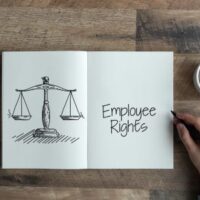Florida Employee Rights and Data Privacy

Since 2014, the Florida Information Protection Act (FIPA) has required employers to protect certain employee data, including private and personal information. In July 2024, the Florida Digital Bill of Rights (FDBR) went into effect, which led consumers, employees, and employers across the state to think carefully about data protection and the privacy of certain personal information. This law was signed by Governor Ron DeSantis in June 2023 after lawmakers in Florida sought to address concerns about job applicant and employee privacy, as well as the privacy rights of other parties in the state.
Under Florida law, what rights do employees have concerning privacy and data protection? our Palm Beach Gardens employment law
Surveillance of Electronic Communications in the Workplace
Is your employer permitted to surveil or access your email or internet use? Generally speaking, when you are working, and when you are using a work device or internet, your employer can monitor certain electronic communications, including your email and the websites you go to, if your employer informed you of this policy in advance and you consented to it.
Your employer is also permitted to have certain forms of video and sometimes audio surveillance for security purposes, but your employer must comply with Florida’s wiretap law — you cannot have your conversations recorded unless you give consent since Florida is a two-party consent state.
Biometric Data and Employment Discrimination Risks
While the collection of biometric data is not always linked to questions about employment discrimination and employee rights, it can be. What is biometric data? According to Innovatrics, it is “a type of personal information that can be used to uniquely identify an individual,” and it can include “fingerprints, voiceprints, iris scans, and facial recognition systems.” For instance, if an employer uses AI tools that rely on the collection of biometric data in processing job applications, or security tools in the office that collect biometric data, that data cannot be used in a discriminatory manner against any job applicants or employees.
Collection of other forms of data can also pose employment discrimination concerns. For example, employers might ask employees to wear a Fitbit, Apple Watch, or similarly tracking devices that log personal fitness data, and even reproductive cycle information. If any of this type of data is used by your employer to treat you unfavorably, you may be able to file a discrimination claim.
Sensitive Information Must Be Protected
When employers lawfully collect certain forms of private information from employees, that information must be kept private. If certain information is made public unlawfully or without consent, various legal violations could have occurred that you should discuss with an employment law attorney.
Contact a Palm Beach Gardens Employment Lawyers
If you have any questions about your rights as an employee or concerns about privacy issues and discrimination, you should seek legal advice. Employers cannot access certain types of private information, and specific laws prohibit employers from sharing specific information or using it in order to discriminate against employees or job applicants. One of the experienced Palm Beach Gardens employment law attorneys at Sconzo Law Office can speak with you today about your case and your options for filing a claim.
Sources:
flsenate.gov/Session/Bill/2023/262/BillText/er/HTML
leg.state.fl.us/statutes/index.cfm?App_mode=Display_Statute&URL=0500-0599/0501/Sections/0501.171.html
leg.state.fl.us/statutes/index.cfm?App_mode=Display_Statute&URL=0900-0999/0934/Sections/0934.03.html
innovatrics.com/glossary/biometric-data/
